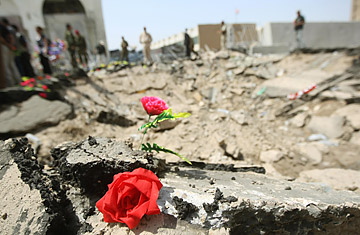
Plastic flowers are placed along the rim of the blast crater by relatives and friends of victims of the bomb site outside the Foreign Affairs Ministry building in central Baghdad.
At the height of the civil war in Iraq, a tidal wave of refugees crossed the border into Syria, changing the face of the capital, Damascus, with their clothing, accents and shell-shocked appearances. Years later, many of the 1.5 million Iraqis remaining in Syria have become a part of the fabric of life. Many own homes or businesses and have children who speak Arabic with a Syrian accent. But one sector of the immigrant population still feels ill at ease: the 400,000 or so Iraqis with ties to the former regime of Saddam Hussein.
Former Iraqi Baathists in Syria have become the subject of an escalating dispute between the Iraqi and Syrian governments that began when suicide bombers blew up government buildings in Baghdad in August, killing 95 people. Iraqi Prime Minister Nouri al-Maliki blamed the bombings on former Baathists in Syria and accused Damascus of harboring and supporting groups that are orchestrating attacks in Iraq. Syria denied the allegations and offered to turn over any suspects in the bombings if Iraq could provide evidence of their guilt. A standoff ensued, dampening the slowly warming relations between the two countries and putting cooperation on a number of issues on hold.
Apparently lost in the dispute, however, are the facts that Syria has been slowly changing its attitude toward securing its border with Iraq and that many former Baathists are now seeking repatriation, having expressed a desire to participate peacefully in Iraq's nascent democracy. Of course, not all Baathists have turned from hawks to doves, and many observers believe that Syria won't stop all insurgent operations on its borders until a regional peace settlement is reached with the U.S. and Israel. But Maliki's government has shown little interest in even opening a dialogue with Syria or the former Baathists about their eventual return to Iraq.
Iraq may have good reason to be less than trusting. Syria has long been a haven for refugees from around the Arab world, particularly those without clean track records. In the aftermath of the invasion of Iraq in 2003, Syria not only allowed anti-American Baathists to organize and hold political conventions in the country, it also permitted jihadist insurgents from other countries to pass through its territory to launch attacks in Iraq. At the time, American officials compared the region where the Euphrates River crosses the Syria-Iraq border to the Ho Chi Minh Trail.
In the last few years, however, Syria has started to clamp down on insurgents trying to infiltrate Iraq, and in August a U.S. military delegation visited Damascus to discuss increased cooperation on border security. Even more promising has been the change of attitude of many former Baathists in Syria, who are broadly split into two factions: a hard-line group led by a former vice president in Saddam's government, Izzat Ibrahim al-Douri, and a more moderate but less powerful group led by Muhammad Younis, a former adviser to Saddam's executive council. Younis's group began reaching out to the Iraqi government in 2007, holding a conference to reevaluate the mistakes of the Saddam regime, reject their old Baathist ideology, and adopt more democratic policies.
Following the August bombings in Baghdad, al-Douri's faction has also shown signs of moderating. In an interview with TIME earlier this month, the unofficial spokesman for the group, Nizar Samra'y, said it is more concerned about the growing Iranian influence on Iraq's government than in forcing U.S. troops out of the country. "We need to have a strong state in Iraq that works [toward] an Iraqi agenda not an Iranian one," he says. "We know America has an interest to return Iraq as a strong country and to stabilize the region. If America withdraws from Iraq now it will have a criminal responsibility." In order to stabilize the country, however, he said the U.S. needs the help of the former Iraqi political leaders and army commanders in Syria. Those leaders are now willing to negotiate a return to Iraq, so long as they have security guarantees and the laws that prevent former Baathists from working in government are revoked.
The U.S. has been quietly pushing the Iraqi government to begin a process of national reconciliation to reduce the risk of sectarian violence as the U.S. withdraws its forces. But Maliki's decision to blame Younis for the August bombings and demand Syria extradite him is a sign that he has no interest in negotiating with former Baathists, says Fadil al Roubai, an Iraqi political analyst in Syria. "It's a political accusation to keep Syria from pushing Iraq to engage this wing in the political process," he says.
Syria is not about to hand over former Baathists for prosecution, either. Syrian officials point out that their country protected many members of the current Iraqi government when they were exiled by Saddam, including Maliki himself, who spent 20 years in Damascus. "There are [now] 1.5 million Iraqi refugees in Syria," Fayssal Mekdad, Syria's Vice Minister of Foreign Affairs tells TIME. "When they came here we didn't ask them what party they belonged to. We just opened our doors."
